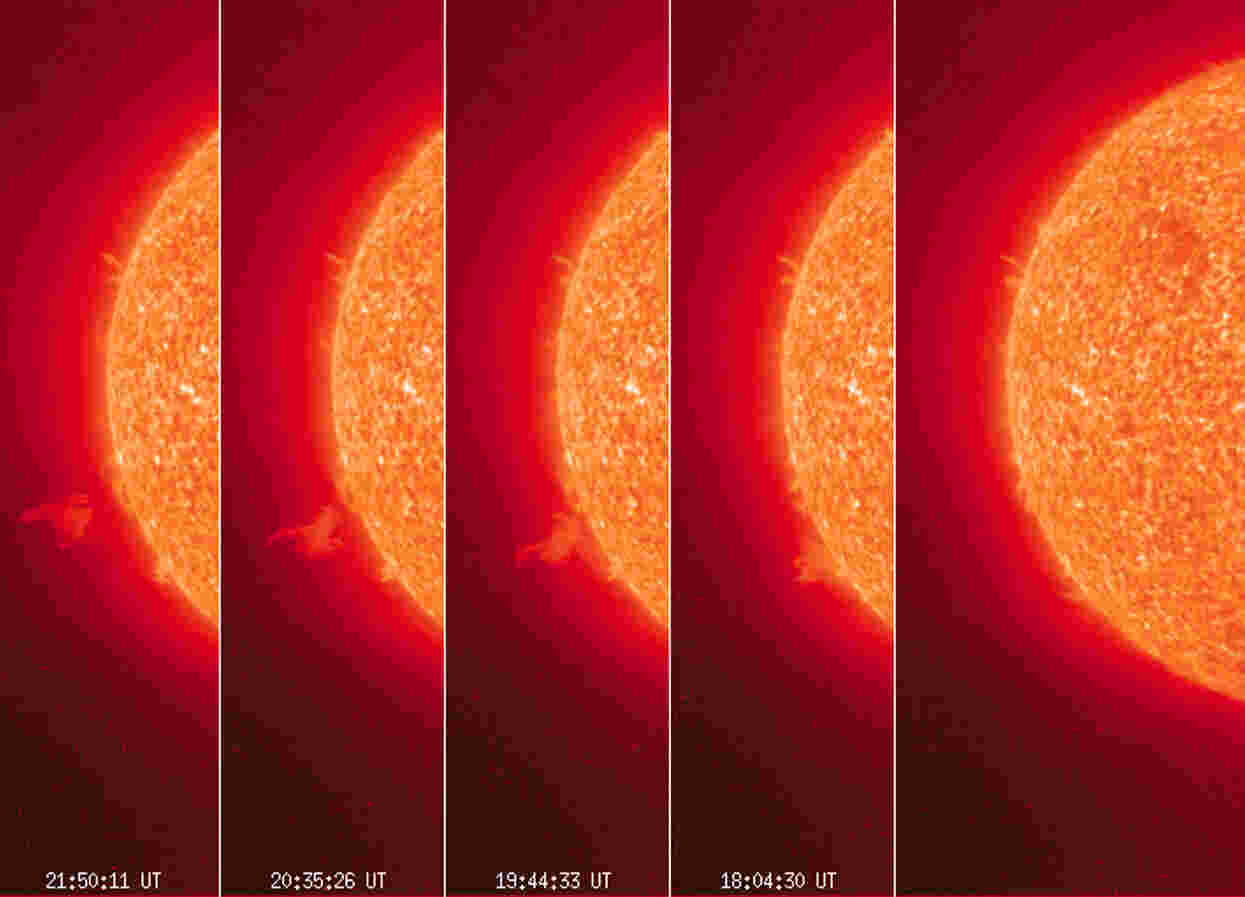
| Class Schedule: | T,Th 2:30-3:45 |  | |
| Class Location: | Duffy 206 | ||
| Professor: | Dr. Eugene Quinn | ||
| Email: | equinn1@stonehill.edu | ||
| Office Hours: | Office: Duffy 241 | ||
| General Information | Announcements | Syllabus | Software | Policies | Grading |
| 1/10/2015 | Stonehill College is committed to providing all students equal access to learning opportunities. The Center for Academic Achievement is the campus office that works with students who have disabilities to provide and/or arrange reasonable accommodations. Students registered with The Center, who have a letter requesting accommodations, are encouraged to contact the instructor early in the semester. Students who have, or think they may have, a disability (e.g. psychiatric, attentional, learning, vision, hearing, physical, or systemic), are invited to contact The Center for Academic Achievement for a confidential discussion at 508-565-1208. |
Solar image courtesy of NASA
With the advent of wireless connectivity, it has become possible for students to use their own computers rather than meet in a lab, which offers a number of advantages. However, this approach will require you to install certain software packages on your personal computer.
All of the software we will be using is listed in the table below. All programs are free, and have Mac and PC versions.
We will have an install-a-thon on the first day class meets, so be sure to bring your computer. If you like, you can try to do the installs on your own - in fact, this is not a bad idea because there are a couple of sizeable downloads.
There are some dependencies among the programs listed, so try to install them in the following order:
| Item | Description | Links |
| LaTeX (pronounced "la-tech") | LaTeX is the gold standard for typesetting documents containing scientific and math notation. We will use LaTeX in conjunction with the knitr R package to produce composite documents. | Mac users should install MacTex, windows users should install MikTex. |
| JAGS ("Just Another Gibbs Sampler") | A package for performing Markov Chain Monte Carlo (MCMC) simulation | mcmc-jags.sourceforge.net |
| The R statistical computing system | Open-source statistical computing system. R currently has over 5,000 packages and tends to be the place cutting-edge techniques show up first. | R website. You can choose any of the available mirror sites for the download, they are equivalent. |
| Rstudio | Integrated development environment (IDE) for R | www.rstudio.com. Rstudio uses both R and LaTeX, so you should install them before Rstudio to allow Rstudio to configure itself properly. |
| The knitr R package | Knitr provides the ability to weave R code and LaTeX together to produce a single document that contains a description of an R program, the R program itself, and the output from the R program, including graphics, in a single pdf. | The knitr package - start R and install knitr with the command: install.packages("knitr") |
| Python | Python has become the "Swiss Army Knife" of data extraction and manipulation, combining ease of use and power. | Home page of the Anaconda python distribution. Like R, python consists of a very large collection of packages. The Anaconda distribution is a collection that contains most of the packages people use for data management and analysis. |
| SAS | The SAS system | SAS is a large commercial software package that is very widely used for data analysis. SAS makes their system available for non-commercial use. The required software configuration has been changing and now requires that you install a virtualization system. My IT contact at Stonehill has gotten this to work with the Oracle VirtualBox software. If most people can get this to work we will make use of it in the course. |
Final grades will be determined from tests, quizzes, assignments, and participation, weighted according to the following table:
| Quizzes | 20% |
| Midterm | 10% |
| Cumulative final | 25% |
| Homework and In-Class Group Assignments | 40% |
| Participation | 5% |
Exact dates will depend on our progress and will be announced well in advance.
These include:
All members of the College community have the responsibility to abide by the College's Academic Integrity policies. This responsibility includes reporting known or suspected violations of this policy to the appropriate faculty
member or to the Dean of the Faculty in the Office of Academic Affairs.
Violations include, but are not limited to the following:
(Page 108 of The Hill Book )
The policies listed under Class Attendance on page 108 of The Hill Book apply;
Note in particular the following:
(Page 108 of The Hill Book - note exceptions for prolonged illness and conflicts with religious beliefs)
My idea of legitimate absences includes:
The value of the final examination is determined by the instructor. If a student misses the examination without sufficient reason, a grade of F is given for this part of the course requirements. The semester grade is then determined in the same way as for students who took the examination.
(Page 109 of The Hill Book)
Back to Dr. Quinn's home page
Back to Stonehill Math Department web page
Back to Stonehill main page